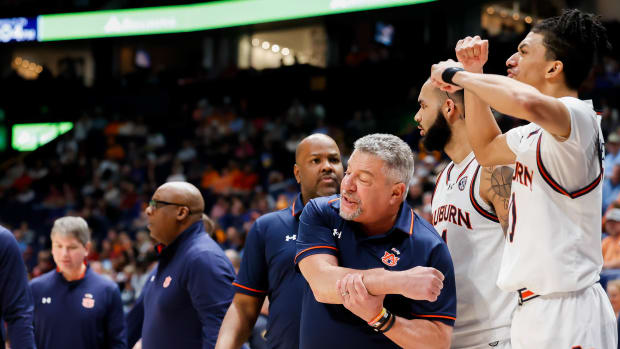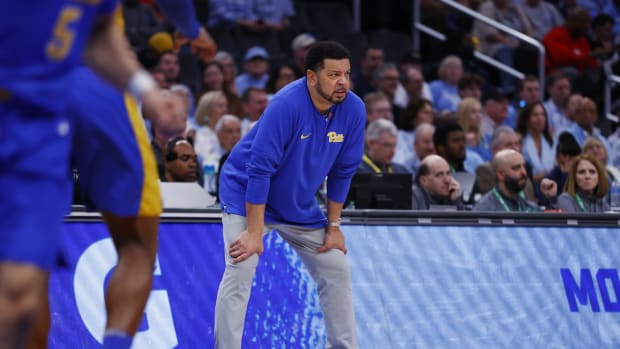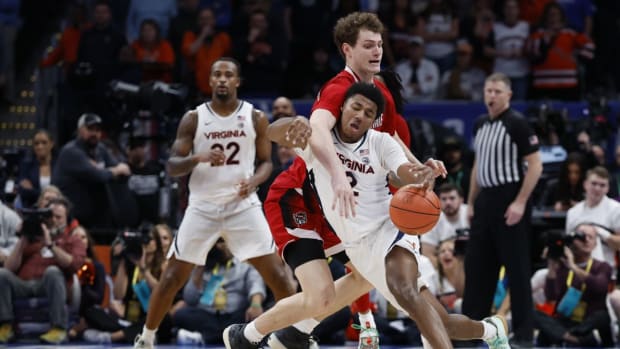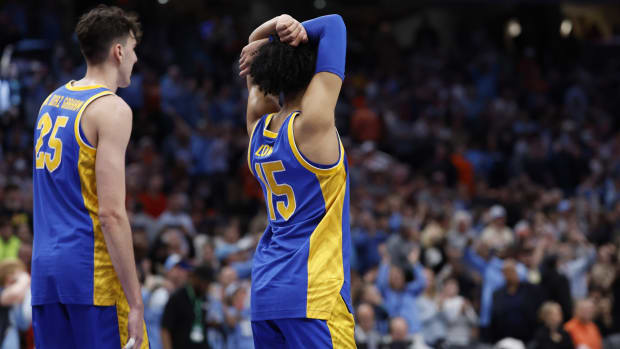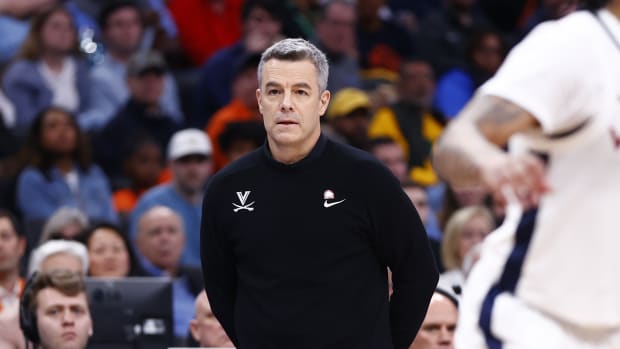On Dec. 27, seven games into a season that could end with a national championship, Juwan Howard talked to his best friend for the last time.
You have reached your limit of 4 premium articles
Register your email to get 1 more
Saying Howard was close to Donnie Kirksey is like saying a burger is close to a bun; the presence of one helped define the other. When Howard’s son Jace was born, Donnie was in the delivery room. (He was on the other side of the curtain, cheering; thanks for asking.) When Donnie met his wife, Dionne, in 2009 he took her to meet Juwan after one week; she said he needed to get “the family approval,” but really, he just needed to see them together. Juwan was always going to be a constant in Donnie’s life. Anybody who loved Donnie had to love Juwan, too. They met when Juwan was a kid in the Chicago projects nicknamed Nook and Donnie was a young basketball coach. By the end—when Juwan was coaching one of his alma maters, Michigan, and Donnie was coaching the other, Chicago Vocational Academy—they talked several times a week, with an ease and depth that nobody else in their lives could match.
“It’s hard to describe because you want to say ‘brother,’ but then you want to say ‘mentor,’ and then you want to say ‘semi-father figure,’ then you want to say, ‘basketball coach,’ ” Dionne says now. “But how do you put all of those titles together?”
The night of that last phone call, Juwan was like the rest of us—“waiting for 2020 to end,” his wife, Jenine, says. But Donnie sounded good. He was recovering from COVID-19. That morning, he had taken his Pomeranian, Dior, for a walk. He washed his clothes and shaved his head. He made plans to get up the next morning so he could get another test. Dionne slept in a separate bedroom in their Chicago home, because of COVID-19. They said goodnight to each other through a mirror that separates the rooms.
The next morning, Dionne heard her husband snoring, more labored than usual. She called his name, but he didn’t answer. He sneezed. She found him drenched in sweat. She shook him. She started doing CPR. Dior curled up next to him. Paramedics came. There was nothing they could do. There would be no autopsy because of the pandemic, but Dionne believes COVID-19 weakened his heart and then he had a heart attack, leaving behind his wife and a daughter.
“I called his mom,” Dionne says, “and then I called Juwan.”
He was in Ann Arbor.
“I need you to come over,” she said.
“What do you mean?” Howard asked.
“I need you to come over now.”
“DD,” he said (he always calls her DD), “what are you saying?”
“Donnie passed away.”
Juwan lost it, regrouped, called Jenine, and then lost it again when he told Jace. People who knew Juwan well, who worked with him and loved him, told him not to drive to Chicago. They had good reasons. It was mid-season; mid-winter; mid-pandemic. Donnie loved basketball with the same intensity Juwan did. He would have understood.
A few hours later, Howard pulled into the Kirkseys’ Chicago driveway. He stayed in his car and opened his window a crack. He asked Dionne to explain what had happened, how Donnie was feeling, what his last words were. There were answers but none that helped. Tears flowed from beneath his sunglasses.
Juwan Howard was 47 years old and all three men in his wedding party were dead.
His other best friend from Chicago, Lamont (Juice) Carter, died in 2011, shortly after being diagnosed with stage 4 metastatic cancer. He was 38. Howard and Carter were so close that Carter’s obituary listed “brothers Juwan Howard, Anthony and Terrence Carter.” Juwan’s cousin Jermaine Howard, who grew up in the same house with him, died last year from complications of diabetes. He was 43. And now Donnie. He was 57. There is nobody else left for Juwan Howard, not like those guys.
“Just loss after loss after loss,” Jenine says. “He has literally lost all of his closest friends.”
Howard talked to Dionne for less than an hour, long enough to help her get through the day, which was all anybody could really do. He never got out of the car. Then he turned around and drove the 240 miles back to Ann Arbor, back to the sport that saves him whenever he needs to be saved.
Sign Up to Play SI's Bracket Challenge and Compete For a Chance to Win Prizes.
Create Your Group Now | Official Rules | Print Your Bracket

Howard and Kirksey were friends since the Michigan coach was a kid growing up in Chicago.
Courtesy of Dionne Kirksey
Twenty-two months ago, Michigan brought Juwan Howard back to be the face of its men’s basketball program, a move that some dismissed as a marketing decision. Howard, then an assistant with the Miami Heat, had never been a head coach. He had not worked in college basketball since he entered the NBA draft in 1994. But he was a big name, a longtime pro and a star for one of the most famous college teams of all time, Michigan’s Fab Five.
The questions seem silly now. The Wolverines, picked sixth in the Big Ten in a preseason media poll, are a No. 1 seed in the NCAA tournament. Their top six players include two Howard inherited (Isaiah Livers, who went down with a stress injury in the Big Ten tournament, and Eli Brooks); two he recruited (Franz Wagner and Hunter Dickinson) and two he picked up as transfers (Mike Smith and Chaundee Brown)—but they play a more unified brand of ball than the Fab Five ever did. Howard has molded a rare and beautiful basketball creation: a team that plays so hard, efficiently and unselfishly on both ends of the floor that it rises above its considerable talent.
“I am so proud of Nook!” Donnie Kirksey told his wife in his final days. “Oh my god, he is coaching his butt off!”
Donnie sat with the Howards at Juwan’s introductory press conference. He knew what so many didn’t: Juwan Howard needed this. He always did. The Fab Five, with their baggy shorts, unrelenting trash talk and love of attention, raised Howard’s profile, but they also obscured his basketball character. He did not play for the show. Juwan was a kid from Chicago whose parents struggled with addiction, who was raised largely by his grandmother, and who saw basketball not just as a way out, but as a way in. The game provided the structure he craved and the work that gave him purpose.
“The most fundamental player that maybe I’ve ever coached,” says his college coach, Steve Fisher. “He would come out and work on technique, pivoting ... he’d work diligently for hours. He was not your greatest athlete, but boy, he was precise. He wanted perfection out of himself.”
Howard’s NBA career was a perpetual search for what he calls his “sanctuary.” He became a star in Washington, then signed with Miami as a free agent because, he said at the time, he wanted to play for Pat Riley, the hardest-driving coach in the league. The NBA voided that deal for reasons that don’t much matter anymore, and they sent him back to Washington, where fans turned on him for trying to leave. The implication that he was disloyal or playing for the money cut him to the bone. He had depression. But whenever he struggled, basketball righted him. “It redeemed him,” Jenine says. “Rebirthed him.”
This is why he needed Donnie and Juice: They connected him to the South Side without handcuffing him to the past. There were no conversational gates between them. One moment they talked like it was 2010; the next, it was 1990; and then it was 2010 again. Athletes like to say that their sport is what they do, but it isn’t who they are. Donnie and Juice understood that Howard flipped that around. Basketball is who he is—not the highlights or the paycheck, but the discipline and the connection to a cause larger than himself. It is the seed for everything else in his life.
As Juwan reached his 30s, his skills and playing time declining, Jenine wanted him to retire. Donnie teased Jenine that Juwan would never walk away, that he would play as long as he could and then coach. Jenine jokes, “I wanted to kill him,” but of course Donnie was right. Juwan retired from the Heat and became an assistant coach, working for the team whose ethos most suits his own. In that role, he could handle the losses. But he got frustrated by entitled players who didn’t work hard, who did not value the game as he did. He wanted young Juwan Howards, and he wanted to be their Donnie Kirksey. Juwan and Donnie both loved basketball, of course, but a lot of people in Chicago loved basketball. Donnie loved players who took the game seriously, and Juwan was drawn to the work.
Even now, with Michigan on anybody’s short list of national-title contenders, some people don’t get it. There are whispers that assistant Phil Martelli, the longtime head coach at St. Joseph’s, does the coaching and Howard does the publicity and the recruiting (he has the nation’s No. 1 class coming in next season). There are racist undertones there: Howard, the only Black head coach in the Big Ten, surely must need a white guy to show him the way.
But anybody close to the program knows better. On most days, Howard gets up at 5:30 and makes a coffee on his Nespresso machine and adds two packets of raw sugar as Jenine makes him breakfast. It’s her chance to see him, but also her chance to make sure he consumes food before basketball consumes him. So she does it right: avocado toast on Ezekiel bread with smoked salmon and truffle oil, or his favorite, turkey sausages. He is out the door by 6:30, breakfast in hand. It is often the last thing he eats before he gets home at night; he then grabs a bite and goes back to work.
This is typical behavior for a major-college basketball coach. But it is not typical for somebody who made more than $150 million playing in the NBA. The parts of the job that people thought Howard would hate are what he loves most. He looks forward to every practice. He encourages college players with a fraction of his résumé to pause practice if they have something to teach a teammate. He likes recruiting. Sometimes, when he sees Michigan’s women’s team running through the school’s Player Development Center, he stops practice to give the head women’s coach, Kim Barnes Arico, a high-five. When Michigan needs to call a play late in the game, Howard draws it up. Juwan has told Jenine the only part of the job he really doesn’t enjoy is dealing with the media—not because he gets criticized, but because it’s repetitive.
And what you won’t see on recruiting websites is Howard FaceTiming with a top-five recruit, then hanging up and telling Jenine, “We’re done with this kid.” If a recruit doesn’t make eye contact or have good body language, he’s out. Howard wants guys who are as excited about Michigan as he is, who play hard because they like to play hard, who ask a million questions. Everybody in the program understands: You play defense or you don’t play.
Now the kid from the projects does Bikram yoga. He meditates. He juices. He has six kids (two with Jenine) and a dream job and a full life. All of it can be traced to basketball, and because he has seen the game perform wonders, wonders are what he expects. Jenine says, “Juwan felt like he was gonna win the championship in Miami after LeBron left [in 2014]. I used to be like, ‘Are you crazy?’ ” Last year, with Michigan 19–12 and unranked when the season shut down, Juwan firmly believed his team would win the NCAA tournament. You can imagine how he feels now, at 20–4. This Michigan season might lead to the program’s second national title. It will definitely lead to an emotional reckoning for the head coach.
SI’s tournament newsletter analyzes everything you need to know about the Big Dance: what just happened and what’s happening next. Sign up for Morning Madness here.
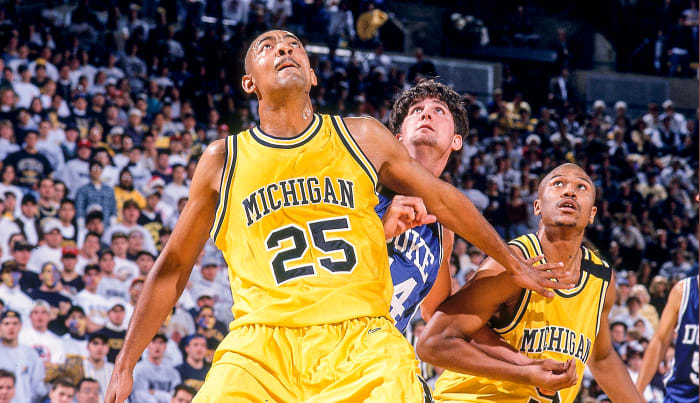
Howard went to two Final Fours as a player; he's looking to make it again as a coach.
Manny Millan/Sports Illustrated
There was a small, socially distanced funeral for Donnie Kirksey in Chicago in January. Howard wanted to say a few words, but when he had a chance, he couldn’t bring himself to do it. His sons, Jace and Jett, spoke instead.
Juwan used to talk to Donnie after every game. (“Basketball,” Dionne says, “was like talking about another child with the two of them.”) At other times, they would FaceTime over a bottle of wine, with their wives by their side. Donnie would text Juwan photos of animals with huge ears, the implication being that they looked like Juwan; Juwan would counter by making fun of Donnie’s belly or bald head. Jenine says “I’ve never seen Juwan laugh like he laughs at their stupid jokes,” and that’s gone now, gone forever, gone like Juice and Jermaine.
The Howards and Kirkseys usually vacationed together in the offseason, and after the pandemic, they were hoping to head for Bora Bora—maybe a private villa, fresh fruit by the pool, a trip filled with laughs from Juwan’s old life and the spoils of his new one. Dionne says quietly, “Won’t be that kind of vacation this year.”
Sometimes she cries herself to sleep and wakes up with a wet pillow. But she says “I honestly don't feel like I've had that breakdown fall-out kind of crazy cry.” The Howards invited Dionne to stay with them in Ann Arbor—using a separate entrance, keeping her distance, just to be near them—but she isn’t ready. She says if she sees Juwan she will have “a breakdown, because that's like looking at Donnie.”
Jenine says: “I think for Juwan, he hasn’t had the fall-out either. There is no way to come back from it right now. I think he thinks if he were to really sob the way his soul needed to cleanse, he wouldn’t be able to come back.”
That approach has worked so far. It won’t work forever.
“He can’t game-plan his way out of the grief,” Jenine says. “You have to stop and feel to be healthy. Juwan compartmentalizes a lot of things. That worries me, to be honest.”
At dinner after he found out he would be named Big Ten Coach of the Year, Howard told Jenine, “Thank you for allowing me to actively pursue my passion. I know this isn’t easy.” Sometimes Jenine wakes up after midnight and sees the light from Juwan’s laptop because he is watching film, lost in the game that he and Donnie loved so much.
Read more of SI's Daily Cover stories here
Full March Madness Coverage:
• Expert Picks and Predictions
• West Region Breakdown: Will Gonzaga's Perfect Run Continue?
• South Region Breakdown: Can Anyone Topple Baylor?
• Midwest Region Breakdown: Surging Illinois Faces Tough Test
• East Region Breakdown: Michigan Leads Intriguing Pack of Challengers


